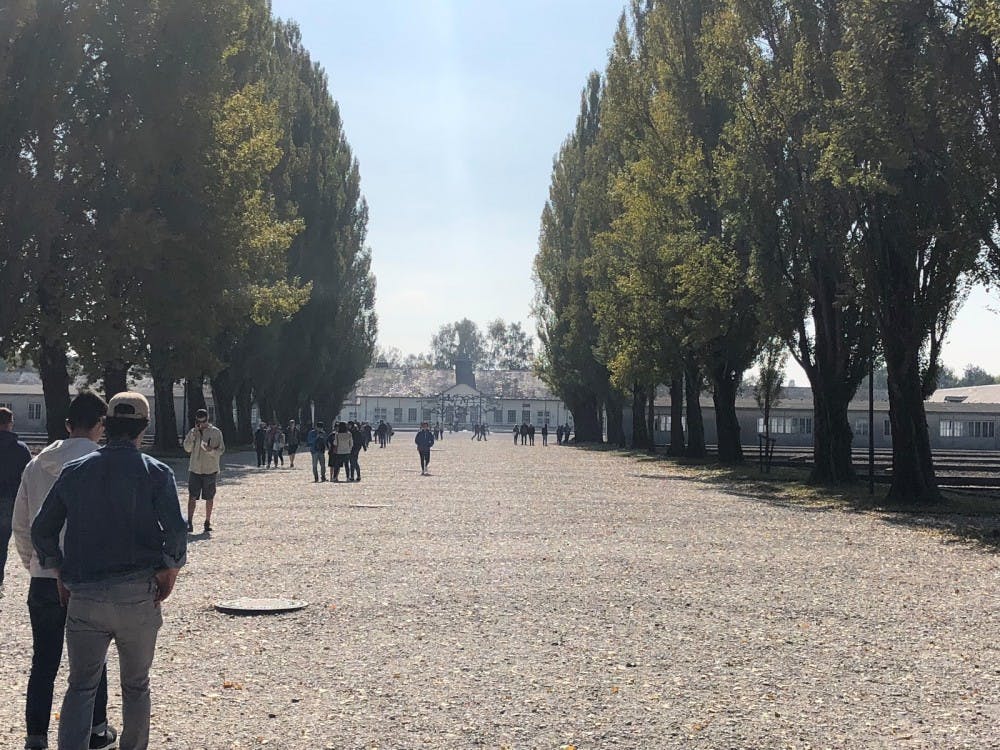This past weekend, I experienced arguably the wildest cultural event of my life by attending Oktoberfest in Munich, Germany. For those of you that are curious, I must say that this festival is truly a once in a lifetime event for any tourist to attend. Despite the constant rowdy partying and presence of tourist traps, Oktoberfest was a great opportunity to engage in Bavarian tradition while also getting a taste of German lifestyle.
While wearing lederhosen and eating pretzels the size of my head was quite fun, my visit to Dachau, a concentration camp, with my fellow Jewish friends from Duke had the most profound and meaningful impact on my experience. Given that it was my first time ever visiting a concentration camp, I had no firm expectations for what I would undergo emotionally.
Dachau opened on March 22, 1933 and was the first concentration camp created under the newly elected Reich Chancellor, Adolf Hitler. Intended to hold political opponents, Dachau gradually became a forced labor camp for Jews, Gypsies and others who were persecuted under Nazi rule.
Redesigned in 1938 to have a capacity of 6,000 prisoners, Dachau contained over 30,000 by 1944, leading to overcrowding and horrific living conditions. It is estimated that more than 32,000 prisoners died from physical oppression, disease, malnutrition and execution with thousands more being transported to extermination camps in Poland.
Prisoners were often subjects of unethical and cruel medical experiments aimed at improving medical technology for German citizens and improving military survival rates. For example, some prisoners were forced to undergo freezing experiments to observe reactions to hypothermia while others were injected with diseases like malaria and tuberculosis in an effort to create vaccinations.
Standing on the same grounds where such atrocities occurred was heart wrenching and overwhelming. As the great grandson of Jewish immigrants who made the long journey through Ellis Island, I could not help but reflect on how fortunate I am. If not for my ancestors who desired a better life in America, I might not be here today given the circumstances of Eastern Europe throughout the 1930s and 40s.
As I walked through the gas chambers and crematoriums that were used for the execution and disposal of prisoners, I tried to put myself in the shoes of those who endured such brutal suffering. I could not help but imagine how a 20-year-old Jewish man would have felt being separated from his family, stripped of his belongings, forced into unfathomably intolerable conditions and robbed of his dignity while fearing for his life.
As I continued to walk around the camp and reflect on what I had seen and read throughout the exhibits, I was bombarded with a rush of emotions. The feelings of anguish and despair for the victims brought me to tears. At the same time, I felt a strong sense of pride and appreciation for the unwavering perseverance of the Jewish faith and community that has endured cruel oppression throughout history. Although late to enter the war, I was proud of the role the United States military had played in destroying Hitler’s reign and liberating prison survivors across Europe. I appreciated that the world we live in today, although by no means perfect, has afforded me a loving family, safe living conditions, and endless opportunity.
Never have I given such deep consideration to Jewish identity and its place in the world. Being Jewish today is not solely about practicing religious traditions on holidays; Judaism, from its most orthodox to secular forms, helps provide a strongly-knit bond that exists between all its people. Regardless of how one practices or where one is from, it is this connection aided by a common history and set of morals that allows Jews to persist and maintain a vibrant presence in the world today.
It truly sickens me that egregious rights violations like those that resulted from the Holocaust can be perpetuated by detestable ideologies rooted in bigotry and prejudice. Unfortunately, anti-Semitic rhetoric and behavior continues to exist in our world today. Earlier this year on Duke’s campus, anti-Semitic posters from the National Socialist Legion were found that contained vile depictions and threatening messages toward Jews. However, this form of vicious hatred will certainly never prevail in our society as long as we continue to reject it with a vehemently stable, moral foundation.
I highly encourage anyone who has the chance to visit a concentration camp as it transforms your perspective and enables you to appreciate the blessings of your life. As you finish reading this, take time to process the fact that we are not far removed from horrific historical enormities. Reflect on how we can improve upon similar issues that continue to plague our society today. Think about what you are truly thankful for, and make sure to express love and gratitude to the special people in your life.
Mitchell Siegel is a Trinity junior. His column, Truth Be Told, runs on alternate Thursdays.
Get The Chronicle straight to your inbox
Sign up for our weekly newsletter. Cancel at any time.
Mitchell Siegel is a Trinity sophomore. His column, "truth be told," runs on alternate Wednesdays.

